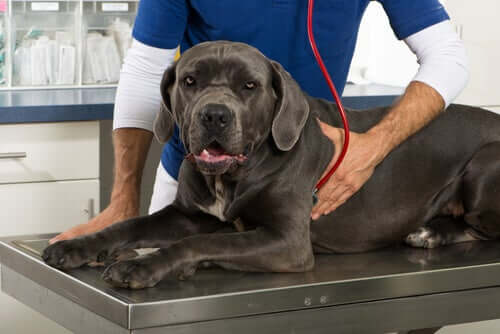Bitches in Season: Heat, Pregnancy and Birth

You’ve just adopted a female dog and you’re full of questions. You’ve heard about bitches in season but you don’t really know all of the details. How will you recognize when she’s in heat or when she gets pregnant. If she does, how long will it be before she gives birth? Worry not, we’re about to answer some of your questions right here.
Today we’d like to analyze a few of the questions you may have in regard to your bitch coming into season. This way you’ll know what to expect and will be qualified to help her when the time comes.
Questions about heat, pregnancy, and birth
Do bitches in season menstruate?

The answer is no. While it’s true that bitches in season do bleed, this is a lot different than human menstruation.
Women bleed to discard their unfertilized egg every month. In the case of female dogs, these bleed at the beginning of their heat cycle and therefore before ovulation. Unlike humans, dogs are not releasing their uterine lining (the inner wall of their womb). Instead, dogs tend to reabsorb it rather than getting rid of it. Estrogen triggers bleeding in their case.
How many times a year are bitches in season?
Bitches come into season about once or twice a year. So, about every six months your dog will go into heat. But, why so few cycles per year?
It seems they inherit this from their wolf ancestors, who constantly had to fight for their survival. That is, getting pregnant and subsequently having offspring made them vulnerable and was detrimental to them.
So dogs naturally evolved to avoid uncontrolled births. That way they could properly take care of their offspring so they would survive.
How long does each estrous cycle last? When will it happen?
Every estrous should last between 2 and 4 weeks. If your dog’s cycle lasts longer than normal, then you should consult your vet as there may be a serious underlying reason for it.
In a healthy and well cared for dog, the first heat can happen around the age of 8 months. However, it’ll vary depending on their breed and size.
Small breeds usually come into season before bigger ones. Make a note of this so you won’t forget. You may need this information in the future if you have to consult a veterinarian.
How do bitches in season behave?
Not only will you see a change in your dog’s behavior, but also in their physical appearance. Their vulva will expand and there’ll be typical bleeding.
It’s possible that the animal will feel tired and stressed. She should get plenty of rest and relax until she feels better.
Why do bitches in season sleep so much?

This is normal, although it doesn’t necessarily happen in every dog. It’s logical that a dog will sleep more due to the fatigue caused by her cycle. This is similar to what happens to women throughout their periods. In fact, this is one of the most noticeable behavioral changes during the heat.
Can a bitch get pregnant in her first cycle?
Yes, although it isn’t recommended as it could lead to physical or psychological problems. If you want to have a litter of puppies, then it’s better to plan it during the second or third cycle.
Should bitches in season have at least one litter?
This is one of those persisting myths out there. Bitches neither have a “need” to mate, nor is their “biological clock” ticking, indicating they should have offspring.
So, there’s no health risk whatsoever to a dog who never gets pregnant in her lifetime. There are zero physical or mental advantages for a bitch to have a litter before spaying.
A common myth surrounding the question about whether or not a bitch should have just one litter before being spayed is the belief that it will calm her down. But, there’s absolutely no evidence to back this up. A hyperactive dog often calms down when they grow older and after proper training.